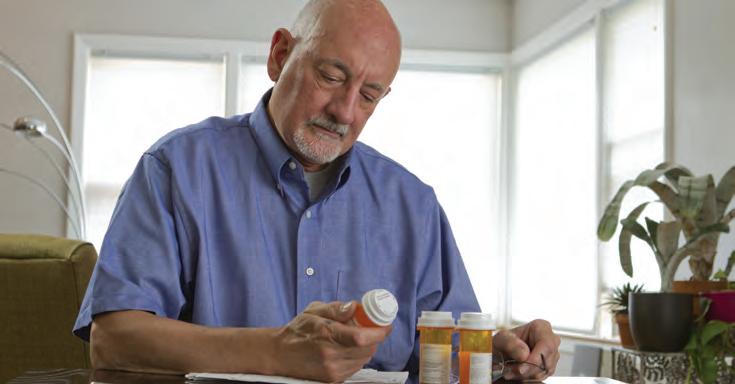
3 minute read
CARE AFFAIRS
If you are worried about becoming vague, forgetful or unsteady, it may not be what you expect. KENDALL MORTON suggests having a close look at the medicine chest.
Older people are particularly vulnerable to the effects of multiple drugs as the body takes longer to metabolise medicines. Slurred speech, confusion, disorientation and dizziness are all possible side effects.
Advertisement
Drug interactions increase the risk of falls and fractures. They can cause incontinence and depression.
The more medications you take, the higher the risk of negative drug interactions.
It’s common to attribute these effects to aging so the cause gets ignored.
Family members who are over 75 and living alone or with an elderly spouse are at particularly high risk from drug interactions.
Another risk factor is having more than one doctor prescribing drugs – prescriptions from the GP, then a heart specialist and then a psychiatrist.
Being on multiple medications makes it hard to know which one is doing what.
How common is this problem? Well, an Australian report called Medication Safety in Australia 2013 found that 20-30 per cent of hospital admissions for people over 65 were medication related. In 12 per cent of cases, the adverse drug reaction (ADR) was considered life-threatening.
The drugs that most often caused ADRs were anti-bacterials, opioids, diuretics, antineoplastic agents, antithromboitcs and cardiac therapy.
Some common adverse drug reactions were gastrointestinal bleeding, nausea, vomiting, hypotension, falls and arrhythmias.
A study from the University of Otago in Christchurch collected data on falls in the elderly and drug usage from colleagues across six universities including Harvard, John Hopkins, and Sydney.
The researchers found individuals who took more than three drugs that affected their sleeping or cognition were twice as likely to break a hip as those taking no medications.
In Australia, there is a service to help understand and better manage medicines. The Home Medicines Review is managed through pharmacies and has been a free service under Medicare since 2001.
First, you need a referral from your regular doctor. Then a pharmacist will come to your home and review your medicines with you.
They will examine any possible drug interactions. The aim is to help you benefit more from your prescribed drugs and to reduce the possibility of side effects.
The visiting pharmacist then writes up a report. Copies go to your GP, specialists and other health care professionals so that everyone has a thorough picture of your medication regime. With better information, comes better care.
The pharmacist can also help with the proper use of medical aids such as blood pressure monitors.
It is advisable to have a Home Medicine Review each year as your health, your weight, your medications or your living circumstances change. Kendall Morton is Director of Home Care Assistance Sunshine Coast to Wide Bay. Call 5491 6888 or email kmorton@homecareassistance.com

Looking for the right surgeon isn’t rocket science - it’s brain surgery.

Sunshine Coast Neurosurgery is the specialist practice of Dr Stephen Byrne, where we apply cutting-edge technology and the latest techniques to deliver world-class healthcare and personalised medicine.
Our List of Services Sunshine Coast Neurosurgery have a specialist interest in minimally invasive brain & spine surgery and use their extensive experience to treat many common conditions such as: • Cervical and lumbar degenerative conditions • Brain tumours • Spine tumours • Pituitary tumours • Chiari malformations. All patients receive one-to-one pre-operative counselling and tailored personalised care using the latest techniques. Please contact us - or speak with your GP for a referral - and we look forward to helping you along the road to recovery.
Sunshine Coast University Private Hospital Suite 17, 3 Doherty Street, Birtinya Q 4575 T 07 5437 7256 E info@scneuro.com.au










